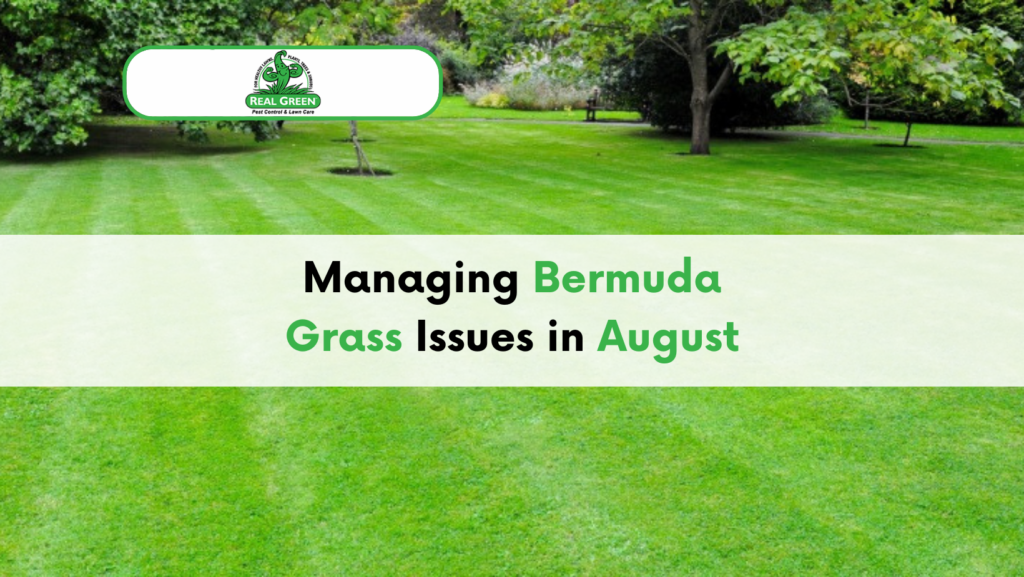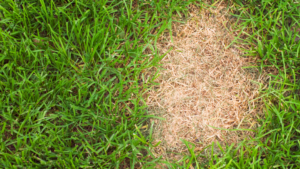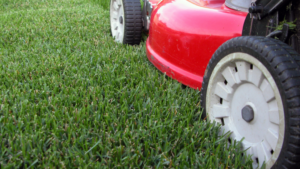
Managing Bermuda Grass Issues In August

Bermuda grass is a popular lawn choice in Texas, prized for its drought resistance and ability to thrive in hot climates. However, August presents several challenges for maintaining its lush, green appearance. The sweltering heat and dry conditions can cause stress, leading to various issues that need addressing to keep your lawn in top shape.
Heat stress, drought, and pest infestations are common problems in August. Proper care and maintenance can help mitigate these issues, ensuring your Bermuda grass remains healthy and vibrant. Understanding the specific needs of Bermuda grass during this time is essential to prevent and treat any problems that may arise.
By paying attention to watering, fertilization, and mowing practices, you can manage these challenges effectively. With the right care, your Bermuda grass lawn can continue to flourish even during the hottest month of the year. Explore these essential tips and techniques to keep your lawn looking its best through the dog days of summer.
Understanding Bermuda Grass
Bermuda grass is a warm-season grass that thrives in hot, sunny climates. It’s known for its deep green color and resilient nature, making it a preferred choice for lawns, sports fields, and golf courses across Texas. This type of grass spreads quickly through stolons and rhizomes, creating a dense and robust lawn that stands up well to heavy foot traffic.

This grass type grows best in temperatures between 75 and 95 degrees Fahrenheit. It requires full sunlight to grow well, so it’s not ideal for shaded areas. Bermuda grass is also drought-tolerant, allowing it to survive dry spells better than many other grass types. However, maintaining its health and appearance involves regular care and attention, especially during the challenging month of August.
Common Problems with Bermuda Grass in August
August can be particularly tough on Bermuda grass due to the extreme heat and limited rainfall typical of Texas summers. Here are some common issues you might encounter:
1. Heat Stress: Intense sunlight and high temperatures can cause heat stress, leading to wilting and discoloration.
2. Drought Stress: Lack of sufficient water can dry out the grass, causing it to become brittle and brown.
3. Weeds: Weeds often thrive under the same conditions as Bermuda grass, competing for nutrients and water.
4. Insect Pests: Bugs like sod webworms and armyworms can cause significant damage by feeding on the grass.
5. Diseases: Fungal infections, such as brown patch disease, may appear due to the hot and humid conditions.
Identifying and addressing these issues early can help prevent significant lawn damage and keep your Bermuda grass in prime condition.
Identifying Drought Stress in Bermuda Grass
Drought stress is a common issue for Bermuda grass during August. Recognizing the signs early can help you take corrective measures before the damage becomes severe.
1. Wilting: Grass blades curl up and wilt when they do not get enough water.
2. Discoloration: Drought-stressed grass often turns a dull bluish-gray or brown rather than its usual vibrant green.
3. Footprinting: If you walk on the lawn and your footprints remain visible, it could be a sign of drought stress.
To address drought stress, ensure your lawn receives adequate watering, particularly early in the morning or late in the evening when evaporation rates are lower. Deep watering is effective, ensuring water reaches the roots rather than just the surface.
Managing Heat Stress for Bermuda Grass
Heat stress is another major concern for Bermuda grass in August. High temperatures can cause the grass to lose moisture quickly, leading to several problems.
1. Shade Management: Provide temporary shade during the hottest part of the day to help reduce heat stress.
2. Proper Watering: Water deeply and less frequently to encourage deeper root growth, which helps the grass withstand heat better.
3. Mowing Practices: Avoid cutting the grass too short, as longer blades provide shade for the soil and reduce evaporation.
Regular monitoring and quick action can prevent heat stress from wreaking havoc on your lawn. Implementing these measures ensures that your Bermuda grass remains healthy and vibrant even during the peak summer heat.
Dealing with Weeds in Bermuda Grass
Weeds can be a persistent problem in Bermuda grass lawns, especially in August when the grass is under stress and weeds can take advantage. Common types of weeds that invade Bermuda grass include crabgrass, nutsedge, and dandelions. These weeds compete with your grass for nutrients, water, and sunlight, making it harder for your lawn to stay healthy.
To manage weeds effectively:
1. Regular Monitoring: Check your lawn frequently for any signs of weeds. Early identification is key to preventing them from spreading.
2. Manual Removal: Pull out weeds by hand or use a weeding tool to remove them from the roots. This is effective for small infestations.
3. Herbicides: Use pre-emergent herbicides to prevent weed seeds from germinating, and post-emergent herbicides to kill existing weeds. Always follow the instructions carefully to avoid damaging your Bermuda grass.
4. Healthy Lawn Practices: Maintain a thick, healthy lawn through proper mowing, watering, and fertilizing to crowd out weeds. A healthy Bermuda grass lawn is the best defense against weed invasion.
By staying vigilant and using proper weed control methods, you can keep your Bermuda grass lawn free of unwanted plants, allowing it to thrive.
Insect Pests That Affect Bermuda Grass
In August, Bermuda grass lawns can be affected by various insect pests that damage the grass by feeding on its leaves and roots. Common pests include:
1. Sod Webworms: These caterpillars chew on grass blades, causing irregular patches of brown grass.
2. Armyworms: They feed on the foliage, leading to significant damage and bare spots.
3. Grubs: These larvae of beetles feed on the roots, causing the grass to wilt and die.
To manage insect pests:
1. Regular Inspection: Check your lawn regularly for signs of pest damage, such as chewed leaves, bare patches, or increased bird activity (birds often feed on these pests).
2. Chemical Treatments: Use insecticides specifically designed for the pests you are dealing with. Follow the instructions carefully to avoid harming your grass or beneficial insects.
3. Natural Predators: Encourage natural predators, such as birds and beneficial insects, which can help keep pest populations in check.
4. Healthy Lawn Maintenance: A well-maintained lawn can resist pest damage better. Proper watering, fertilizing, and mowing practices can reduce the likelihood of pest infestations.
Managing insect pests effectively ensures your Bermuda grass remains healthy and vibrant throughout the summer.
Recognizing and Treating Brown Patch Disease
Brown patch disease is a fungal infection common in Bermuda grass, especially during the hot, humid conditions of August. This disease appears as circular brown patches that can grow and merge, severely damaging your lawn.

To recognize brown patch disease:
1. Appearance: Look for circular, brown, and dead patches of grass with a dark, smoke-like ring around the edge.
2. Moisture Levels: High humidity and excessive moisture create ideal conditions for this fungus to thrive.
3. Temperature: It typically occurs when nighttime temperatures are above 60°F and daytime temperatures exceed 80°F.
To treat brown patch disease:
1. Fungicides: Apply fungicides specifically designed to treat brown patch disease. Follow the application instructions carefully for best results.
2. Water Management: Avoid overwatering and water deeply but less frequently. Water early in the morning to allow the grass to dry out during the day.
3. Thatch Control: Remove excessive thatch buildup, as thick layers of thatch can harbor the fungus and retain moisture.
4. Proper Mowing: Avoid mowing too low, as taller grass blades help shade the soil and reduce humidity.
By identifying and treating brown patch disease promptly, you can prevent it from spreading and causing extensive damage to your Bermuda grass lawn.
The Importance of Proper Watering Techniques
Proper watering is crucial for maintaining a healthy Bermuda grass lawn, especially during the hot and dry conditions of August. Inadequate or improper watering can lead to drought stress and other lawn problems.
Here are some key watering techniques:
1. Water Deeply: Ensure that water reaches the root zone by watering deeply. This encourages deep root growth and enhances drought resistance.
2. Water Infrequently: Water less often but more thoroughly. This helps the grass develop stronger, deeper roots.
3. Timing: Water your lawn early in the morning, ideally between 4 AM and 10 AM. This reduces water loss due to evaporation and allows the grass to dry before nightfall, reducing the risk of fungal diseases.
4. Monitor Soil Moisture: Use a soil moisture meter or simply check the soil with a screwdriver. The soil should be moist but not waterlogged. If the screwdriver goes in easily and the soil feels moist, it’s well-watered.
By following these proper watering techniques, you can ensure your Bermuda grass lawn remains healthy and resilient throughout the hot summer months.
Effective Fertilization Strategies
Fertilizing Bermuda grass correctly is essential for its growth and health. Proper fertilization ensures your grass receives the nutrients it needs to thrive, especially during the hot months.
Types of Fertilizer:
1. Nitrogen-Rich Fertilizers: Bermuda grass benefits greatly from nitrogen. It helps the grass stay green and grow robustly.
2. Slow-Release Fertilizers: These provide nutrients over an extended period, ensuring the grass gets consistent nourishment.
3. Balanced Fertilizers: A mix of nitrogen, phosphorus, and potassium helps establish strong roots and lush blades.
When to Fertilize:
- Early Spring: Apply your first round of fertilizer as the grass begins to grow.
- Mid-Summer: A mid-summer application helps maintain growth during the hottest months.
- Fall: Fertilizing in the fall prepares the grass for winter dormancy.
Using the right fertilization strategies keeps your Bermuda grass healthy and strong, even during the toughest summer months.
Best Practices for Mowing Bermuda Grass
Mowing Bermuda grass correctly helps maintain its health and appearance. Following best practices for mowing ensures that your grass stays thick and lush.

Mowing Tips:
1. Height: Keep Bermuda grass at about 1 to 1.5 inches high. This height allows for optimal sunlight absorption and growth.
2. Frequency: Mow at least once a week during the growing season. Frequent mowing prevents the grass from becoming too tall and reduces the risk of pests and diseases.
3. Sharp Blades: Ensure your mower blades are sharp. Dull blades tear the grass and can lead to stress and disease.
4. Don’t Mow Too Short: Cutting Bermuda grass too short can expose the soil and roots to sun damage and increase the risk of weeds. Keep the mowing height consistent to protect your lawn.
Proper mowing practices are essential for keeping your Bermuda grass healthy and looking its best.
How Chemical Lawn Care Can Help
Chemical lawn care plays a pivotal role in keeping Bermuda grass free from weeds, pests, and diseases. Using chemical treatments helps ensure that your lawn remains vibrant and healthy throughout the year.
Weed Control:
1. Pre-Emergent Herbicides: These prevent weed seeds from germinating, tackling the problem before it starts.
2. Post-Emergent Herbicides: These target existing weeds, effectively killing them and preventing spread.
3. Pest Control: Using pesticides helps address issues with insects like grubs and chinch bugs, which can damage Bermuda grass. Regular treatments keep these pests at bay and protect your lawn.
4. Disease Management: Fungicides treat diseases like brown patch or dollar spot that affect Bermuda grass. Consistent application helps prevent these diseases from taking hold and spreading.
Chemical lawn care is an effective way to keep your Bermuda grass lush, green, and healthy all season long.
How to Schedule Bermuda Grass Care with Real Green
Scheduling your Bermuda grass care with Real Green is easy and straightforward. Follow these steps to get started.
1. Visit Our Website:
Head to our website and navigate to the Bermuda grass care section. You’ll find detailed information on our services and their benefits.
2. Contact Us:
Use our online contact form or give us a call. Speak directly with a representative who can answer your questions and provide expert advice.
3. Schedule an Appointment:
Set up a convenient time for one of our technicians to visit your home for a lawn assessment and service plan. We’ll tailor our services to meet your specific lawn needs.
4. Customized Service Plan:
Our experts will develop a personalized care plan for your Bermuda grass, including fertilization, mowing, and chemical treatments to ensure optimal health.
By following these easy steps, you can schedule comprehensive Bermuda grass care with Real Green today.
Summer Lawn Care: Taming Bermuda Grass
Maintaining Bermuda grass, especially in the hot Texas climate, requires attention to detail and the correct care strategies. From effective fertilization to proper mowing techniques, each step is crucial in keeping your grass healthy and green.
Chemical lawn care treatments further protect your lawn from weeds, pests, and diseases. Adopting these practices allows your Bermuda grass to thrive even during the harsh summer months.
Ready to give your Bermuda grass the care it needs in Austin, TX? Contact Real Green today to schedule a professional lawn care service and enjoy a lush, green lawn all year round!
